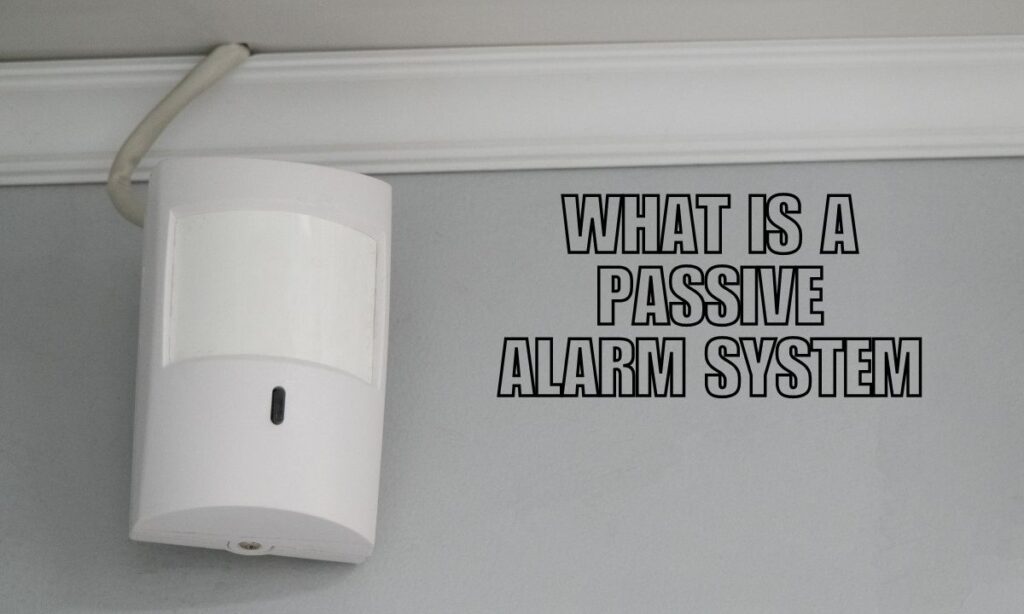Security is a major worry for both households and business owners in today’s world. Protecting one’s property and belongings is essential, and having a reliable alarm system is a crucial aspect of any security setup. One type of alarm system that has gained popularity is the passive alarm system. In this article, we will explore what a passive alarm system is, how it works, its benefits, its installation and setup process, integration with home security systems, its use in business settings, and the differences between passive and active alarm systems.
What is a Passive Alarm System
A passive alarm system is designed to detect and alert individuals to unauthorized entry or unusual activity in a property without requiring any active engagement from the user. Unlike active alarm systems that require manual activation, such as pressing a button or entering a code, passive alarm systems operate automatically. They are always on and ready to detect any suspicious movement or a breach in security.
How Passive Alarm Systems Work
Passive alarm systems utilize various sensors and technologies to detect unauthorized entry or unusual activity. These sensors are strategically placed around the property and are triggered when certain conditions are met. Once a sensor is activated, the alarm system sends out an alert, either through a loud siren, a notification to a connected mobile device, or by contacting a security monitoring service.
Benefits of Passive Alarm Systems
Passive alarm systems offer several benefits for both homeowners and business owners. Firstly, they provide continuous protection, as they are always active and ready to detect any potential threats. Additionally, passive alarm systems are discreet and less obtrusive compared to active systems, as they do not require manual activation. They are also more convenient, as users do not need to remember to arm or disarm the system.
Types of Passive Alarm Systems
There are various types of passive alarm systems available in the market. Let’s look at some of the more regularly utilized ones:
Passive Infrared (PIR) Sensors
PIR sensors detect changes in infrared radiation emitted by objects within their field of view. They are commonly used to detect human presence in an area.
Magnetic Contact Sensors
Magnetic contact sensors are used to detect the opening or closing of doors and windows. They consist of two parts, a magnet, and a switch, which separate when a door or window is opened, triggering the alarm.
Glass Break Sensors
Glass break sensors are designed to detect the sound or vibration of glass breaking. They are commonly used to protect windows and glass doors.
Vibration Sensors
Vibration sensors detect vibrations or movements caused by attempts to force open doors, windows, or other entry points. When significant vibrations are detected, the alarm is triggered.
Pressure Sensors
Pressure sensors are placed on surfaces like floors or carpets and detect changes in pressure. They can be used to detect someone walking or standing in a particular area.
Motion Detectors
Motion detectors use various technologies, such as passive infrared, microwave, or dual technology, to detect motion within a specified range. They are widely utilized in both home and commercial environments.
Installation and Setup
The installation and setup process for passive alarm systems may vary depending on the specific system and manufacturer. It is generally recommended to consult the user manual or seek professional assistance for the installation process to ensure the proper placement and functionality of the sensors.
Integration with Home Security Systems
Passive alarm systems can be integrated with home security systems to provide comprehensive protection. They can work in conjunction with other security devices, such as security cameras, access control systems, and monitoring services. The integration allows for centralized control and monitoring of the entire security system.
Passive Alarm Systems for Business Use
Passive systems are not limited to residential properties and are widely used in business settings as well. They are valuable for securing offices, retail stores, warehouses, and other commercial establishments. The ability to detect unauthorized access or unusual activity helps protect valuable assets and ensures the safety of employees and customers.
Passive Alarm Systems vs. Active Alarm Systems
While passive alarm systems offer continuous protection without the need for manual activation, active alarm systems require user intervention to arm and disarm the system. Active systems often involve keypad codes or key fobs to activate or deactivate the alarm. The choice between passive and active alarm systems depends on the specific security needs and preferences of the user.
Common FAQs
How effective are passive alarm systems?
Passive alarm systems are highly effective in detecting unauthorized entry and unusual activity. They provide an additional layer of security and help deter potential intruders.
Can passive alarm systems be bypassed?
While passive alarm systems are designed to be tamper-resistant, no security system is entirely foolproof. However, proper installation, strategic sensor placement, and integration with other security measures can minimize the chances of bypassing the system.
Are passive alarm systems suitable for all types of properties?
Passive alarm systems can be tailored to suit various property types, including residential homes, apartments, offices, and commercial buildings. The specific requirements may vary, and it is essential to choose the right system based on the property’s size, layout, and security needs.
Can passive alarm systems be integrated with smart home technology?
Yes, passive alarm systems can be integrated with smart home technology. This integration allows users to control and monitor the alarm system remotely through their smartphones or other smart devices.
What are the maintenance requirements for passive alarm systems?
Passive alarm systems typically require regular maintenance to ensure proper functionality. This may include testing the sensors, replacing batteries, and keeping the system up to date with the latest firmware or software updates.
Conclusion
Passive alarm systems provide a reliable and convenient way to enhance security and protect properties from unauthorized access or unusual activity. Their continuous monitoring capabilities and integration with other security measures make them a valuable addition to any residential or commercial security setup.
Prepared to take your home security to the next level? Upgrade to Callaway Security‘s advanced alarm systems and protect your home with cutting-edge technology. Contact us today for a free consultation and put your mind at ease.









